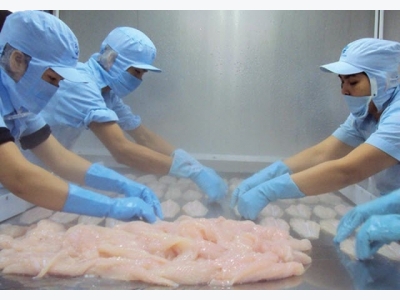90% of pangasius catfishes in the US market are imported from Vietnam

According to the Vietnam Association of Seafood Exporters and Producers (VASEP), from 1st September 2017, pangasius catfishes will be officially recognized by the US Government as a type of catfish. However, the domestic production, imports, and exports of pangasius catfishes will be under the surveillance of the US Department of Agriculture (USDA).
Pangasius processing.
From now to 1st September 2017, the US Food and Drug Administration (FDA) is still responsible for ensuring that imported pangasius catfishes meet all necessary food safety standards. It means that the USDA will inspect all stages of the production chain in Vietnam, from eggs to final packaging.
90% of catfishes sold in the US market have been imported from Vietnam. Although enhanced testing can be viewed as a sensible way, Vietnamese pangasius catfishes have been successfully sold in the US over the past 10 - 15 years and there are no cases related to pangasius catfishes harmful to US consumers.
The Vietnam pangasius industry is probably the most strictly regulated seafood industry in the world. Farms are certified by independent and reputable organizations such as ASC, BAP, and Global G.A.P ... and Vietnamese catfish processing factories meet HACCP standards as well as IFS certification and BRC. Almost pangasius catfishes have been approved to export to the EU market which has very strict import criteria.
However, all of these are of no value in the states of Mississippi, Louisiana, and Alabama in the Southern United States, where catfishes and pangasius catfishes are considered to be low-cost species which damage their market.
Instead of promoting domestic catfish as a "high-value" species, US catfish farmers have launched a long and fierce battle to smear Vietnamese catfishes in whatever way they can.
Accordingly, they publicized that Vietnamese pangasius catfishes were raised in the Mekong River, contaminated with Agent Orange. However, the fact shows that Vietnamese pangasius catfishes are now cultured in specialized ponds and fed with pellets.
Their lawsuit claimed that companies in Vietnam, with the income of less than a fifth of the US, subsidized US consumers using catfishes. According to FAO's report, CFA has alleged that the Government of Vietnam has intervened deeply into the economy and therefore they can not assess the cost of Vietnamese products.
Through representatives of the National Assembly, catfish farmers in the Southern States have asked the US Department of Commerce to calculate Indian catfish costs, fillets, and freezers at fictitious plants and transported them in supposed ships to the United States. This assessment has led to the conclusion that Vietnamese producers are unfairly subsidized and have to pay a 190% tax rate for pangasius catfishes.
Antidumping duties still exist although the tax rates are various. For example, the leading producer and exporter of pangasius catfishes named Vinh Hoan has a tax rate of 0%. Actually, the tax is collected from the importer and then the importer will collect the exporters. In addition, there is also a "deposit" in the event of a "discovery" of dumping, which can amount to $US 1 million (€ 942,000) and must be paid to the US.
Facing all these obstacles, it is understandable for Vietnam to give up the US market. In fact, China has nearly surpassed the US to become the Vietnam's largest pangasius export market. However, Vietnam is still struggling to meet the USDA requirements.
However, if Vietnamese producers can meet the requirements of the USDA, a major US market is waiting for them. Pangasius catfishes are now more common than American catfishes if Vietnamese pangasius catfishes are renamed into "catfishes", Vietnam pangasius industry has a great potential to boom in sales.
The US catfish industry has not taken full advantage of its potential and can not meet the needs of the US potential market on its own. This is why the US must at all costs to remove Vietnamese pangasius from their market.
Related news
 Ministry strives for sustainable development of tra fish
Ministry strives for sustainable development of tra fish In an effort to ensure a sustainable development of the tra fish sector, the Ministry of Agriculture and Rural Development will support enterprises and farmers
 Soaring tra fish prices entice Mekong farmers
Soaring tra fish prices entice Mekong farmers With prices of tra skyrocketing, farmers in the Cửu Long (Mekong) Delta are scrambling to breed the fish, paying little heed to warnings from experts.
 VN catfish exporters gear up for US inspections
VN catfish exporters gear up for US inspections If Vietnamese producers can meet USDA’s requirement, a huge market in the US awaits them